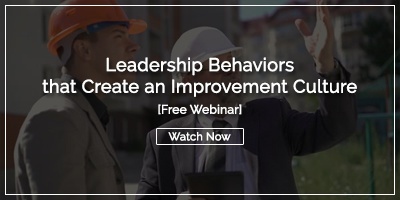 What does perseverance mean to you?
What does perseverance mean to you?
No matter how you define it, we want to let you in on a secret—or rather, some research-backed information – that we learned at one of our previous User Conferences.
The takeaway is this: Perseverance is not a fixed trait.
It’s malleable. An individual's perseverance can be continuously improved upon with the right mindset. That’s what David Yeager, Associate Professor of Psychology at UT-Austin, explained at our event last year. We learned a great deal from our guest speaker and feel confident you will too - here's an overview of his talk.
Why Is Perseverance Important?
There’s a tendency in our society to think about perseverance, or grit, as a trait we either have or lack. That said, Yeager stresses that anyone can persevere under the right circumstances.
In 2011, the Carnegie Foundation for the Advancement of Teaching launched an initiative to take what was known about continuous improvement in manufacturing and healthcare, and apply it to a major educational problem.
The foundation sought to reform the community college system in the U.S., enhance students’ success in their remedial math classes, and increase the graduation rate within the system. In addition to developing a new curriculum, researchers revised the math pathways—by teaching statistics instead of Algebra I, for example—and discovered two things with regard to continuous improvement and perseverance:
- You can have a great idea or a killer reform, but people won’t always know how to use it.
- There is significantly variable quality in the way changes are implemented.
As a professional, it can be threatening to accept that what we’ve been doing for years isn’t working. In turn, it can be challenging to confront the problems we’ve created while also making positive changes.
And yet, it’s by learning from our mistakes that we grow more resilient. The Carnegie Foundation ultimately persevered, and increased the success rate of their initiative from 15% in two years to 55% in one year. As a result, thousands of adults from across the country are now able to get the academic training they need and move on to attain the credentials they want.
During our conference, Yeager emphasized that perseverance matters most when we go outside our comfort zone. In our changing economy, it pays to learn new things before we need to know them; we’re dealing with matters so complicated that we must pull knowledge from different domains and learn to apply them in a range of situations. This is one of the reasons why grit is so important.
Do People Persevere in Learning New Things?
The short answer is yes—absolutely.
In surveys, Yeager and his team like to give people a choice and determine what percent of participants choose the easy thing over the hard thing.
We persevere when we can reflect on the challenges we face. As such, if we aren’t learning anything, then chances are we aren’t reflecting—that is, we aren’t persevering to the full extent that we could be.
Consider a National Study of Learning Mindsets survey in which a random sample of 16,000 ninth graders were given two options: They could tackle a simple assignment that would ensure an “Easy A,” or they could solve a more challenging problem yet risk a lower grade.
The results? 63% of participants chose the Easy A.
This, however, isn’t our natural state of being. We are born resilient, but between the ages of eight and 18, we experience a linear decrease in intrinsic motivation to succeed in school.
In a nutshell, we start school talking about all the things we could be, and leave school talking about all the things we’ll never be.
Why? Because our worries zap our natural desire to persevere. When we feel judged, we only want to do those things at which we excel. There’s a culture of performance judgment in our society where we celebrate “gifted” people, and then tear them down when we find they are no longer infallible.
As leaders, we can change this. We can create environments where people recapture their desire for grit and perseverance.
How Can Leaders Inspire Perseverance?
Trust, growth, and purpose are crucial. Just think about a performance review: If you don’t trust that the reviewer has fair and unbiased feedback, you won’t feel motivated to change. On the other hand, if you respect the reviewer’s opinion, you’ll be more likely to learn and grow.
This is where deliberate practice comes in. A technique to facilitate growth rather than judgment, the concept involves setting a specific goal, concentrating 100%, getting feedback, and then practicing until you gain fluency.
It isn’t a far cry from Anders Ericsson’s 10,000-hour rule, which involves focusing completely on a specific item or task until you master it.
Some of us may think that if a person has overcome a challenging or traumatic event - say the loss of a loved one - then they have the grit to master other challenges. But the lesson only applies if the person sees how their experience is relevant.
Surviving a car accident won’t necessarily mean you feel you can ace a difficult math class. You must first analyze the situation and understand how it’s relevant to other learning experiences.
With this in mind, leaders can onboard new team members by asking them to reflect on their experiences and link those situations to what they’ll be doing at the company. This is a form of deliberate practice that helps to promote workplace success.
Similarly, leaders can learn to deliver feedback in a way that genuinely encourages continuous improvement. Instead of criticizing team members with no explanation, they must communicate that their feedback relates to a specific standard - and that by delivering it, they can work closer to that standard together. Feedback should inspire perseverance rather than hinder it.
This is because while failure isn’t beneficial in itself, learning from failure can help us tremendously. To persevere, according to Yeager, it’s important to keep a growth mindset and remember that intelligence can be developed - it isn’t fixed.
David S. Yeager
Faculty Research Associate — Ph.D., Stanford University
Associate Professor of Psychology
Dr. Yeager is interested in understanding the processes shaping adolescent development, especially how social cognitive factors interact with structural and physiological factors to create positive or negative trajectories for youth. He is also interested in learning how to influence these psychological processes, so as to improve developmental and educational outcomes for youth. He primarily conducts randomized experiments in school settings because he believes, as Bronfenbrenner and Lewin did, that a good way to understand the system of forces affecting behavior and development is to try to change it. In addition, in the process of designing experiments, we may create interventions that, with some adaptation, may be useful for addressing important problems facing society.




Add a Comment